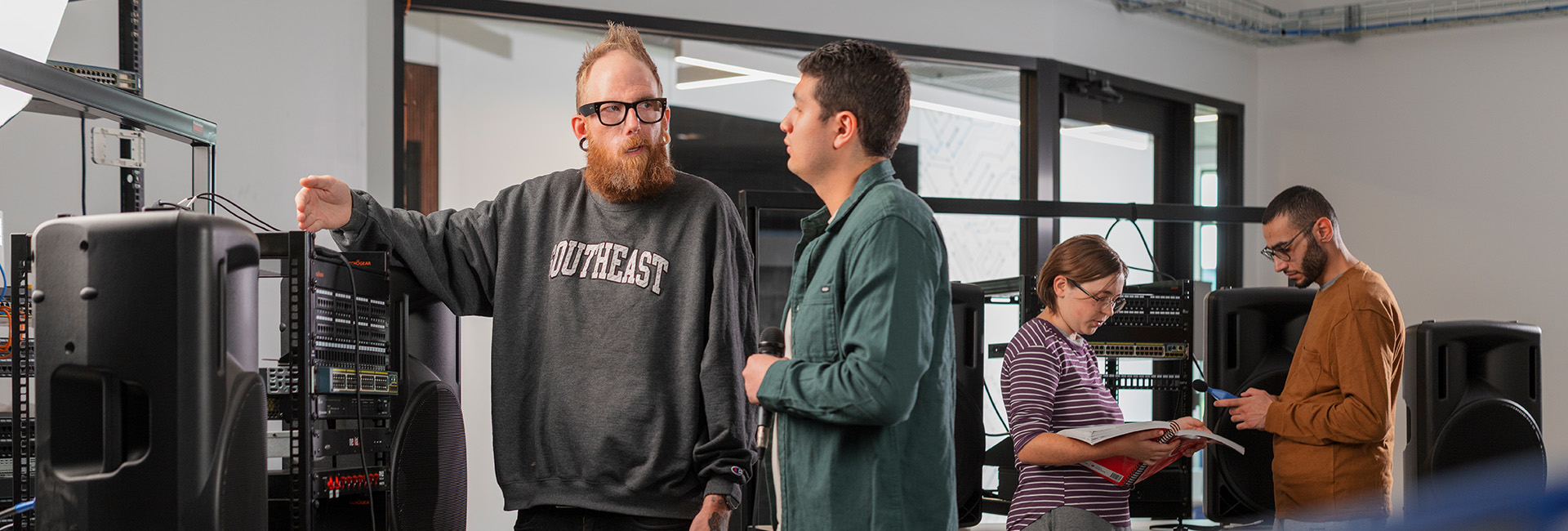
Electronic Systems Technology
Power Up Your Future
Our Electronic Systems Technology program teaches you to fix, install and troubleshoot electronic systems. You'll learn to repair specific components rather than replacing entire devices. Through hands-on lab work and classroom learning, you'll gain skills in hardware setup, equipment installation and programming. These skills prepare you for careers as an electronic systems tech or general maintenance technician. No prior electronics knowledge needed—just bring your problem-solving attitude and technical curiosity.
PROGRAM OBJECTIVES
Master Electrical Concepts and Circuits
Learn the ins and outs of DC and AC circuits and gain deep knowledge of electrical concepts. You'll develop skills to operate, wire and troubleshoot three-phase motor and control circuits.
Build Communication System Skills
Learn to install and maintain data communication systems, security/fire alarm systems and telephone systems. You'll gain practical knowledge about antenna radiation patterns and voice/data communication that employers value in the field.
Develop Component-Level Troubleshooting
Master the ability to diagnose and fix electronic problems at the component level. You'll learn about diodes, transistors, SCRs, and TRIACs - the building blocks of electronic systems.
AVD/Low Voltage Technician
A.A.S. / Certificate
Locations: Lincoln
The AVD/Low Voltage Technician program prepares you for a career installing and maintaining essential electronic systems in almost any building. Learn to work with security systems, data networks, audio-visual equipment and fire alarms using industry safety standards.
ESTIMATED TUITION
$7,625 (A.A.S.) / $1,875 (Certificate)
CREDIT HOURS
61 (A.A.S.) / 15 (Certificate)
PROGRAM LENGTH
4 Terms (A.A.S.) / 1 Term (Certificate)
SCHEDULE
Full-Time / Part-Time
STARTING TERM
Fall / Spring
Electronic System Technician
A.A.S. / Certificate
Locations: Lincoln
The Electronic System Technician program teaches you how to work with transistors and other active devices, troubleshoot electronic systems and understand voice communication technology. You'll explore analog and digital modulation, study antenna radiation patterns and gain hands-on experience with fiber optics.
ESTIMATED TUITION
$8,000 (A.A.S.) / $2,125 (certificate)
CREDIT HOURS
64 (A.A.S.) / 17 (certificate)
PROGRAM LENGTH
4 Terms (A.A.S.) / 2 Terms (certificate)
SCHEDULE
Full-Time / Part-Time
STARTING TERM
Fall / Spring
WHY SCC?
Do I need prior experience in electronics to succeed in this program?
No prior electronics knowledge is needed as we designed the program for beginners. If you're a problem-solver who enjoys working with your hands and taking things apart, you'll do great. We start with basic skills and build up from there.
How much hands-on experience will I get?
You'll spend about 50% of your time in the lab getting hands-on experience and the other 50% in the classroom learning theory. This balance helps you apply what you learn right away and prepares you to excel in the field.
Will the program help me find a job after graduation?
Employers visit our campus regularly to share job opportunities with students. Our program works closely with Career Services to help you find employment, and we maintain strong connections with industry partners who regularly hire our graduates.
Are there internship opportunities with this program?
Many employers recruit directly from our program looking for interns and apprentices, often with the goal of hiring full-time after graduation. While internships aren't required, there are plenty of opportunities available.
CAREER OUTCOMES
Electronics Engineering Technician
Design, build, test and repair electronic components and equipment under the direction of engineers. You'll work with circuit boards, control systems and telecommunication devices. These technicians may focus on product evaluation, quality control, or manufacturing.
Electronic Equipment Installer and Repairer
Install, maintain and repair electronic equipment like communication systems, industrial controls, and security systems. You'll use diagnostic tools to troubleshoot problems and replace defective components.
Avionics Technician
Specialize in aircraft electronic systems including navigation, radar, communications and flight control systems. You'll test, troubleshoot and repair these critical components to ensure aircraft safety and performance. This career combines electronics knowledge with aviation applications.
Additional Resources
- Please note that the following programs are currently under review by the Department
of Education for federal financial aid. Students are not able to receive federal financial
aid for this program until it has been approved.
- Electronic Systems – AVD & Low Voltage, Certificate
- Students may qualify for the Future Ready Workforce Program
- Accreditation